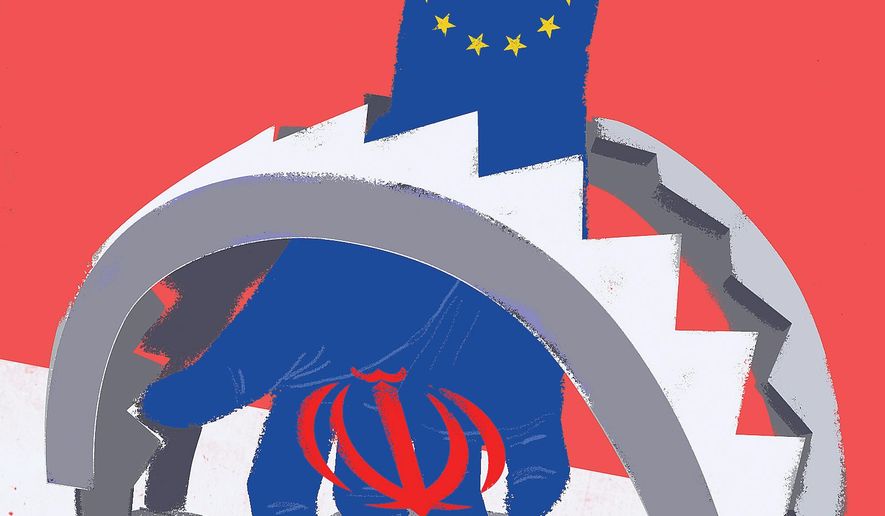OPINION:
The Chinese government isn’t concerned about the short-term economic effects of President Trump’s tariffs. The European Union is concerned with nothing else. For a fistful of dollars they are siding with the world’s foremost terrorist regime against the nation that has protected them since 1945.
As we will see in a moment, the EU is desperately trying to maintain its economic ties with Iran despite that fact and the events of July and August.
In early July, Iranian President Hassan Rouhani — regarded by some as a moderate, as if there were such a leader in Iran — threatened to close the Strait of Hormuz if U.S. economic sanctions were re-imposed. Mr. Trump, after trading threats with Iranian leaders, offered to meet with “anybody” from Iran at “any time they want to” without preconditions, an offer similar to the one former President Obama made during his 2008 campaign.
Both Mr. Obama’s and Mr. Trump’s offers of talks without preconditions were statements of weakness. Preconditions are essential because the ayatollahs always refused to meet their diplomatic obligations. They need to earn a measure of trust by meeting preconditions such as the withdrawal of Iranian forces from the Syrian border with Israel’s Golan Heights. If they refuse, any American negotiations with Tehran would amount to an endorsement of Iran’s rogue behavior.
When Mr. Trump made his offer of negotiations, Iran quickly rejected it and began its naval exercise in the Strait of Hormuz in the first week of August.
The Strait is the narrow seaway bordering Iran and Oman through which almost 30 percent of the world’s oil purchases flow. At its narrowest point, its shipping lanes are only six miles wide. Iran’s annual naval exercises in the Strait are supposed to demonstrate its ability to close it.
Iran’s naval and air forces could close the Strait for a short time by laying mines, sinking ships to block the shipping lanes or bombing oil tankers from the air. Iran won’t do so for two big reasons.
First, if Iran attempted to close the Strait, U.S. and allied naval and air forces would quickly force its reopening. That would mean a short, violent war with Iran that Iran couldn’t win and could lose in ways that would threaten, or end, the regime’s existence. The Iranian economy is in tatters thanks to Mr. Trump’s sanctions and huge anti-regime protests are common. Iran can’t afford such a war.
Second, Iran’s principal oil export facility is on Kharg Island, north of the Strait in the Persian Gulf. It would be an enormously attractive target in such a war.
Despotic regimes such as Iran’s kakistocracy sometimes act irrationally. That means that though a war with Iran to reverse a closure of the Strait, while unlikely, is still possible.
Last week, Mr. Trump ordered re-imposition of sanctions on Iran. According to The Wall Street Journal, the sanctions ” prohibit Iran’s access to U.S. dollars, sanction Iran’s trade in gold and precious metals, outlaw the purchase of Iran’s sovereign debt, and sanction Iran’s automotive sector.”
In a written statement, Mr. Trump said America would continue to exert maximum economic pressure on Iran while remaining open to negotiations to reach a comprehensive deal that addresses Tehran’s malign behaviors. He also warned that nations which trade with Iran won’t trade with America.
In November, more severe sanctions will be put in place aimed at stopping Iranian oil sales. China, India and other nations will continue to buy Iranian oil, knowing the president can’t stop trading with them. The European Union insists that its businesses should be exempt from the re-imposed sanctions and have taken an action to force the president’s hand.
Last Tuesday, the EU issued a “blocking statute” intended to achieve an exemption from U.S. sanctions. In 1996, it issued a similar statute banning European companies from complying with U.S. sanctions against Cuba and refusing to recognize court rulings enforcing those sanctions. President Clinton retreated, exempting the EU from the sanctions.
The revised blocking statute adds anti-Iran sanctions to the prohibition against enforcing U.S. sanctions on Cuba. It enables EU companies to sue the United States and says that any EU company that decides to end its trade with Iran will first have to get permission from the EU. It’s a bad bet for the EU because any European company that continues to trade with Iran could itself be sanctioned. This president isn’t going to back down like Mr. Clinton did.
American companies are often criticized for focusing too much on quarterly profits and disregarding the future. The European Union’s member nations are taking that short-sightedness to a far higher level, giving higher priority to short-term monetary gains over their national security — and ours.
All but a few of our NATO allies — most of which are EU members — have, for far too long, refused to invest in their own defense. The EU’s blocking statute is a shameful decision that is in perfect harmony with their rejection of their responsibility to help us defend them.
The Iranian economy is in tatters, and widespread anti-regime protests continue. We need to keep the pressure on. China is Iran’s ally and both our adversary and largest trading partner. It is far less susceptible to our pressure, so Mr. Trump will have to find another solution to their support of Iran.
• Jed Babbin, a deputy undersecretary of defense in the George H.W. Bush administration, is the author of “In the Words of Our Enemies.”




Please read our comment policy before commenting.